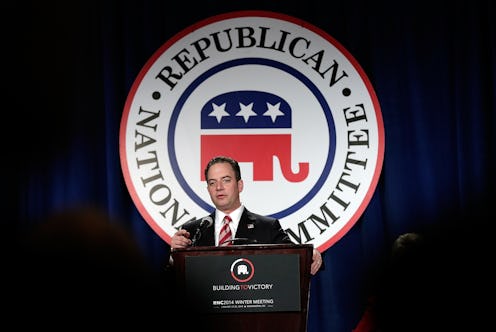News
The History Of Brokered Conventions
In order to become either the Republican or Democratic party nominee for president, candidates need to secure more than half of their party's delegates. Members of the GOP establishment who don't want to see Donald Trump represent conservatives in the general election in November are hoping for a brokered convention so they have a chance to nominate someone other than the real estate tycoon. The history of brokered conventions doesn't offer much hope though, considering there hasn't been one in decades.
If you aren't quite sure what a brokered convention is, here's the deal — a Republican presidential hopeful has to get at least 1,237 of the total 2,472 delegates at the national convention in order to win the nomination, and a Democratic candidate needs 2,382 of the 4,763 delegates this year. If no one reaches that magic number after every state has held its primary or caucus and superdelegates (who aren't bound to a candidate based on the primary election) have cast their votes, it becomes a brokered convention, and the party has to continue holding votes among the delegates until a candidate has a majority of support.
After the first ballot, delegates have the freedom to switch their votes so that one candidate can get more than 50 percent of delegates. Republicans that want to stop Trump's rise to the White House are hoping that delegates (who are current or former party leaders or elected officials) will use the opportunity to back someone other than the outspoken billionaire.
With four men still in the race, it is possible that none of them will have enough votes to secure the nomination; however, it would be the first contested GOP convention in almost 70 years. In 1948, Thomas Dewey eventually became the nominee after his two opponents withdrew on the third vote, giving him all the delegates. The last real brokered convention on the Democratic side occurred in 1952, when Adlai Stevenson won the nomination in the third delegate ballot.
More recently, incumbent President Gerald Ford and Ronald Reagan were in a fierce contest for the GOP nomination in 1976. Neither candidate had a clear majority heading into the convention, but Ford garnered enough votes just before the delegates held their first vote; therefore, it never became a full-blown brokered convention.
Similar to the Ford-Reagan race, the 1984 Democratic convention began without a clear nominee. Former Vice President Walter Mondale was the front-runner, but needed 40 more delegates to officially beat out Gary Hart. When the first vote was cast, Mondale was named the Democratic nominee thanks to support from a majority of superdelegates.
It's important to note that neither Dewey, Ford, Mondale, nor Stevenson won the general election, making it seem that contested or almost-contested conventions don't lead to party victories. Unfortunately for the GOP, even if they're able to nominate someone other than Trump in a brokered convention this summer, it isn't likely that the divided party will beat either Hillary Clinton or Bernie Sanders in November.
